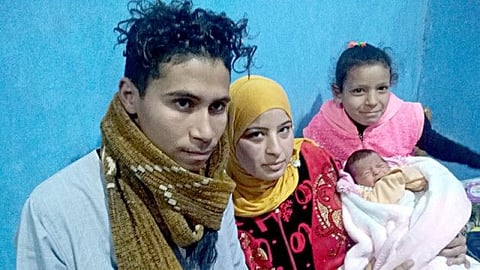Dad of Egypt’s 100 millionth baby plans 2 more
Government struggles to put the brakes on unruly population rise

Cairo: The father of Egypt’s 100 millionth newborn has said he wants to get two more children, as the country’s government steps up efforts to curtail the country’s mushrooming population.
On Tuesday, Egypt’s population at home climbed to 100 million, according to the state statistics office, highlighting the challenges the country faces as it is striving to reinvigorate economy battered by years of unrest.
Ramadan Rabae, a 22-year-old resident in the southern province of Minya, is the father of Yasmin who was born on Tuesday, marking Egypt’s 100 millionth.
“We didn’t know about this designation until we were informed by the Health Office,” Rabae told a local television late Tuesday.
“She is my first baby. I want to have two more children and that’s all,” he told private television Ten. “One should get two or three children maximum because life has become hard and costly,” added the farmer.
Some 201 babies are born in Egypt each hour, according to the state demographic statistics with an annual population growth of around 1.7 per cent.
The population increase, termed by state officials as “horrifying”, has prompted the Egyptian government to launch multiple campaigns in recent years to raise public awareness about threats posed by rapid population growth to development efforts.
Earlier this week, the government unveiled a plan to limit state subsidies to two children for every family in a bid to curb the population increase that makes Egypt the Arab world’s most populous country.
The new measure will include both food and cash subsidies.
Around 70 million Egyptians benefit from a socialist era-ration system that give them access to subsidised food items including bread, sugar and cooking oil.
An estimated 1.14 million poor Egyptian families get monthly cash support under the government programme “Takaful” or “Interdependence”.
In 2017, Egypt’s Ministry of Health and Population mounted a drive aimed at cutting down the nation’s population to 112 million from an estimated 128 million by the year 2030.
Under the plan, families are encouraged to have, at most, two children instead of the average of four.
The Ministry of Social Solidarity, which is in charge of helping poor and vulnerable Egyptians, has also initiated a campaign entitled “Two are enough” targeting provinces with the highest birth rates.
Around 27.8 per cent of Egypt’s population live under the poverty line, according to official figures.
Most of the poor are residing in underprivileged and rural areas where people believe that birth control is prohibited by Islam, the religion practiced by the majority of Egyptians.
The country’s Muslim clerics have repeatedly said that family planning is not against Islam.



